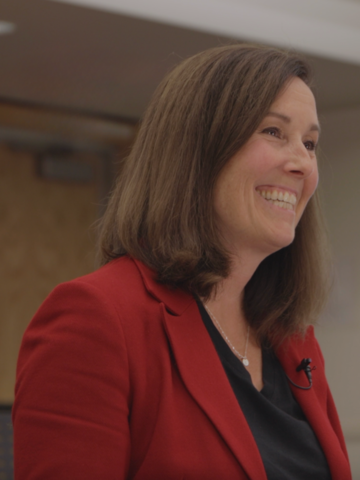By Rachel Doherty

What is sustainability? Is it a trend, a buzz word or a real solution to many of the climate, economic and social issues we’re facing today?
According to Jennifer Roedding, Business Transformation Consultant, Coach, and Executive in Residence at the Hub for Sustainability Integration at the University of Waterloo— sustainability is often misunderstood.
With our inaugural Hub for Sustainability Integration Conference coming up next month, we sat down with Roedding to help paint a clearer picture of how leaders can integrate sustainability into their businesses and see larger profits in the long run.
On a personal level, what motivates you to advocate for sustainability in business?
My personal and professional motivations are very much aligned. I am passionate about our world and the interconnectedness of it all. As a consultant, I thrive on opportunity, transformation, optimization and change. Sustainability in business is right at that intersection— the opportunity to do better for our world, to thrive in a sustainable economy and to be innovative and transform businesses will ultimately add value to those organizations.
What are the biggest barriers for businesses when it comes to sustainability integration today?
The biggest one is a lack of understanding. There is a huge opportunity for organizations to educate themselves on how sustainability applies to the economy, the planet and people. Once that is more fully understood, and that the business case for it is positive, then sustainability can be integrated into organizations and their decision-making processes. Sustainability is an investment that can add value in a significant way to an organization.
Why is integrating sustainable business practices important now more than ever?
It’s time to take action if we want to achieve our global climate goals. Most people know this, however, there are social impacts as well. Legislation will soon come into effect and companies will be required to adopt more sustainable business practices. There is already sustainability legislation in Europe and California, so if you’re a Canadian company that does business abroad, that might already be affecting you.
Having more sustainability built into your everyday practices drives the value of your company. Where there is a risk there is also an opportunity. Also, from a marketing and hiring perspective— people want to work for companies that are considering the future.
What are the first steps that someone can take to integrate sustainable business practices into their business or organization?
The first step is to understand the concepts. Sustainability is about Environmental, Social and Corporate Governance (ESG) concepts. Then, I recommend conducting a materiality assessment to understand the areas that most impact a company. It’s important to look at what issues are directly impacting your company and how they can be mitigated more sustainably.
For example, I have worked with businesses in the service industry that don’t think they have a significant impact on the environment, but unbeknownst to them, the continuous heating and cooling of data centres has been reported to have more greenhouse gas emissions than the aviation industry.
This is why my colleagues and I at the University of Waterloo were inspired to put together the Hub for Sustainability Integration Conference on March 21st. If you are interested in developing a broader understanding of strategic sustainability impacts on the future of business, the economy, and society, attending this conference will provide valuable takeaways.
What specific insights or takeaways do you hope attendees will gain from attending the conference?
Sustainability — and by that, I mean all aspects of ESG — is currently one of the biggest global disruptors. Everyone is at a different place in their understanding of the multifaceted issues and at a different place in integrating sustainability into business and decision-making. This conference will have something for everyone, no matter their level of understanding.
Conference attendees will leave with a broader understanding of strategic sustainability issues and practical ideas to take back and integrate into their organizations.
Do you have any tips for conference attendees on how to make the most of their experience?
Bring someone with you from your organization, take notes on opportunities, and then take the conversation back to your organization and apply your learnings.
Ultimately, every decision an organization makes should consider 'Is this contributing to a sustainable economy, planet, and population?'
Please visit The Hub for Sustainability Integration website for more information on the upcoming conference including registration, agenda, speakers and more.